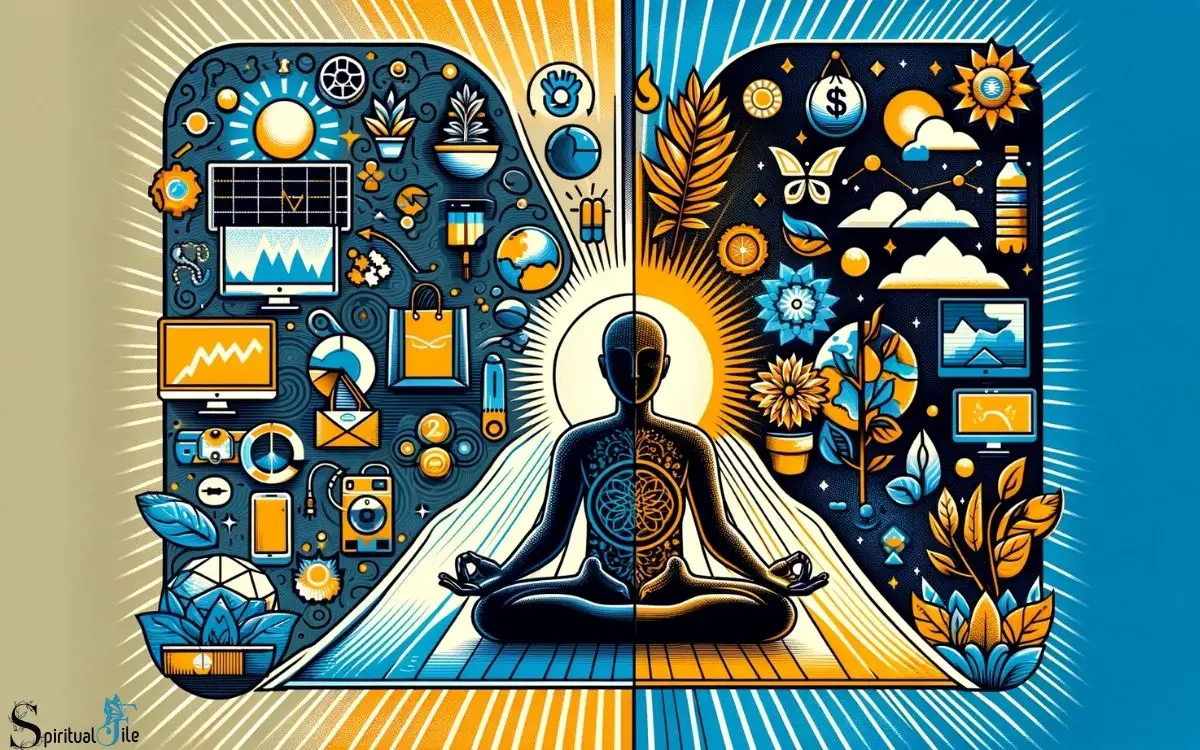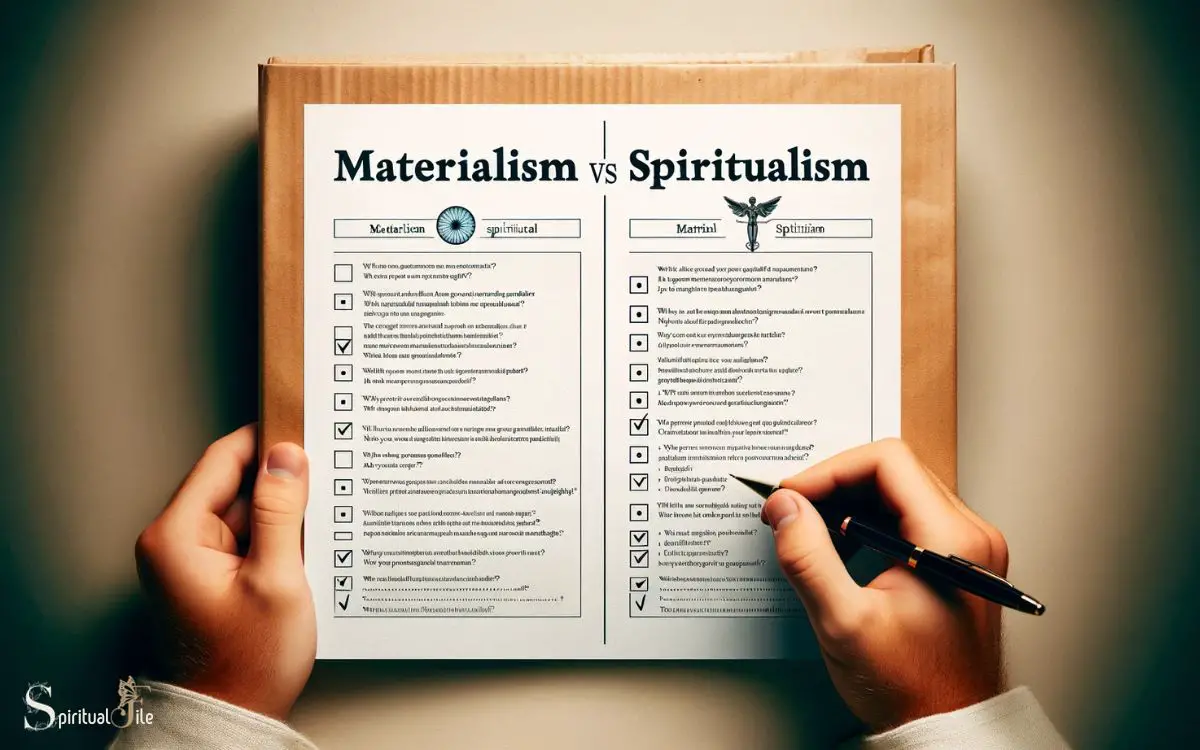Materialism Vs Spiritualism Test: Self-Assessment!
Understanding the Balance between Materialism and Spiritualism through Self-Assessment.
The Materialism Vs Spiritualism Test offers a reflective analysis that helps individuals understand their inclination towards material wealth or spiritual growth.
By exploring this balance, one can gain insights into how each philosophy influences their personal happiness and overall life satisfaction.
Materialism and spiritualism represent two opposing worldviews that can shape our lives. Materialism focuses on the acquisition of physical possessions and worldly success, whereas spiritualism emphasizes inner peace and transcendent experiences.
The Materialism Vs Spiritualism Test is a tool designed to help people evaluate which of these philosophies they lean towards. It prompts introspection on personal values and life choices, illustrating how these preferences influence one’s well-being.
- Materialism: Prioritizes tangible assets and social status.
- Spiritualism: Values intangible aspects like personal growth and connection to something greater.
Discover your philosophical leanings with the Materialism Vs Spiritualism Test, a guide to better understanding your path to fulfillment and how it shapes your daily life.

Key Takeaway
Comparing Materialism and Spiritualism: A Comprehensive Test
| Test Questions | Materialism | Spiritualism |
|---|---|---|
| Do you find satisfaction in acquiring new possessions? | Yes | No |
| Do you prioritize your inner peace over material possessions? | No | Yes |
| Is your happiness tied to your wealth? | Yes | No |
| Do you believe that money can solve all problems? | Yes | No |
| Do you often find yourself contemplating about the purpose of life? | No | Yes |
| Would you be content even if you had minimal possessions? | No | Yes |
| Do you value experiences over owning things? | No | Yes |
| Does the idea of growing spiritually appeal to you? | No | Yes |
| Are you often preoccupied with thoughts of wealth accumulation? | Yes | No |
| Does your life revolve around personal growth and understanding rather than material success? | No | Yes |
Understanding Materialism and Spiritualism

Analyzing materialism and spiritualism involves understanding their underlying principles and implications.
Materialism is centered around the belief that material possessions and physical comfort are paramount, often leading to a focus on wealth, status, and consumerism.
This perspective tends to prioritize the tangible aspects of life and may neglect the spiritual or emotional needs of individuals.
On the other hand, spiritualism emphasizes the importance of non-material values, such as personal growth, inner peace, and connectedness with the universe.
It often involves seeking meaning beyond the physical realm and embracing concepts like mindfulness, compassion, and gratitude.
Understanding these contrasting ideologies is essential for individuals seeking to navigate their own beliefs and value systems, as well as for those aiming to comprehend the motivations of others.
The Impact of Materialism on Well-being

The impact of materialism on well-being can be assessed through examining its influence on mental and emotional health.
Materialism has been found to have several negative effects on well-being, including:
- Increased levels of stress and anxiety due to the constant pursuit of material possessions.
- Decreased overall life satisfaction as the focus shifts from experiences and relationships to acquiring goods.
- Higher likelihood of developing mental health issues such as depression and low self-esteem.
- Reduced sense of purpose and fulfillment, as materialistic pursuits often fail to provide lasting happiness.
These factors collectively contribute to a diminished state of well-being for individuals heavily influenced by materialistic values.
Understanding these impacts is crucial in promoting a more balanced and holistic approach to life and well-being.
The Impact of Spiritualism on Well-being

Spiritualism has a profound impact on well-being, encompassing mental, emotional, and physical aspects. It provides a sense of purpose, connection, and inner peace, which are vital for overall well-being.
Engaging in spiritual practices, such as meditation, prayer, or mindfulness, can alleviate stress, anxiety, and depression, promoting a healthier mental state.
Spirituality often encourages compassion, gratitude, and forgiveness, fostering positive emotions and relationships that contribute to emotional well-being.
Moreover, spiritual beliefs and practices have been linked to improved physical health and resilience.
People who feel spiritually fulfilled tend to exhibit greater resilience in the face of adversity. Understanding the impact of spiritualism on well-being is crucial for individuals seeking holistic wellness.
Transition: Now, let’s delve into the process of taking the materialism vs spiritualism test.
Taking the Materialism Vs Spiritualism Test

Upon completing the Materialism Vs Spiritualism Test, individuals can gain insight into their philosophical inclinations and values. This self-assessment tool provides an opportunity to better understand one’s perspective on material possessions and spiritual fulfillment.
Here are some key points to consider when taking the test:
- Reflect on your relationship with material possessions and whether they hold significant value in your life.
- Consider your beliefs about the nature of happiness and fulfillment.
- Assess your attitudes towards the pursuit of wealth and success.
- Evaluate the role of spirituality or transcendental experiences in your overall well-being.
By engaging with these aspects, individuals can gain a deeper understanding of their underlying beliefs and attitudes towards materialism and spiritualism. This understanding can be instrumental in shaping personal growth and decision-making.
As you complete the Materialism Vs Spiritualism Test, the next step is interpreting your test results to gain a comprehensive understanding of your philosophical inclinations and values.
Interpreting Your Test Results

Interpretation of test results is crucial for gaining insight into one’s philosophical inclinations and values. After completing the Materialism Vs Spiritualism Test, understanding the implications of your results is essential.
If your score leans towards materialism, it suggests a prioritization of material wealth and physical possessions, often associated with a focus on the tangible aspects of life.
On the other hand, a leaning towards spiritualism indicates a greater emphasis on inner fulfillment, interconnectedness, and the pursuit of meaning beyond material possessions.
It’s important to note that these inclinations exist on a spectrum, and your results may provide valuable insights into your priorities and beliefs.
Regardless of the outcome, reflecting on the implications of your results can prompt personal growth and deeper self-awareness.
How Can Materialism And Spiritualism Coexist In A Holistic Life?
Finding harmony between a material vs spiritual life is possible by embracing both worlds. Materialism offers comfort and security, while spiritualism brings inner peace and purpose. Balancing material desires with spiritual values allows for a holistic life, where one can enjoy abundance without losing touch with the soul’s needs.
Frequently Asked Questions
How Do Cultural and Societal Factors Influence an Individual’s Beliefs in Materialism or Spiritualism?
Cultural and societal factors significantly shape an individual’s beliefs in materialism or spiritualism.
These include upbringing, education, media, and social norms, which influence values, attitudes, and perceptions, ultimately impacting one’s worldview and philosophical outlook.
Are There Any Specific Personality Traits or Psychological Factors That May Be Associated With a Preference for Materialism or Spiritualism?
Certain personality traits and psychological factors may be associated with a preference for materialism or spiritualism.
These factors could include openness to experience, level of empathy, and the need for meaning and purpose.
Can Someone Be Both Materialistic and Spiritual at the Same Time?
Yes, it is possible for someone to hold both materialistic and spiritual beliefs concurrently. Materialism and spirituality can coexist within an individual’s value system, influencing different aspects of their life and worldview.
What Are Some Practical Strategies for Finding a Balance Between Materialism and Spiritualism in Daily Life?
Balancing materialism and spiritualism in daily life requires mindful moderation.
Practicing gratitude, setting meaningful intentions, and embracing simplicity are practical strategies. Cultivating awareness of personal values and priorities aids in navigating this delicate equilibrium.
Is There Any Evidence to Suggest That Individuals Who Score High on the Materialism Vs Spiritualism Test May Experience Changes in Their Beliefs Over Time?
There is evidence to suggest that individuals who score high on the materialism vs spiritualism test may experience changes in their beliefs over time.
Research indicates that life experiences, self-reflection, and exposure to diverse perspectives can influence belief systems.
Conclusion
The materialism vs spiritualism test provides insight into the impact of these opposing beliefs on well-being.
Understanding the influence of materialism and spiritualism on one’s life is essential for personal growth and fulfillment.
By taking the test and interpreting the results, individuals can gain a deeper understanding of their values and beliefs, ultimately leading to a more meaningful and mindful existence.






